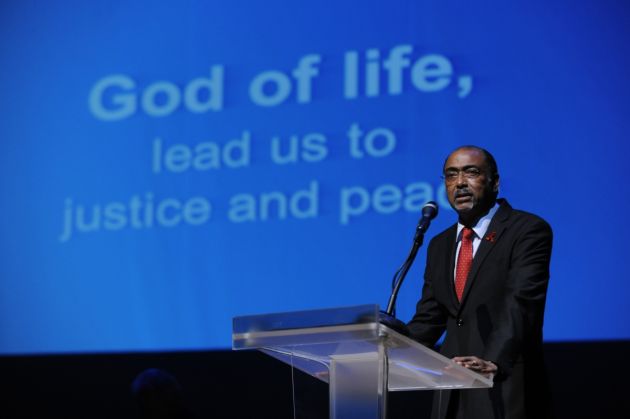UNAIDS chief urges churches to remove sexuality and stigma barriers

Michel Sidibé, executive director of UNAIDS, the United Nations organization that focuses on HIV and AIDS, has urged churches to remove sexuality and stigma to exclude people.
He made a plea for cooperation between Christian bodies and international organizations fighting HIV and AIDS in a speech at the 10th Assembly of the World Council of Churches in Busan, South Korea.
As December 1 is World AIDS Day his words to some 5,000 participants at the international ecumenical gathering on October 31 are appropriate.
Meanwhile, Caritas Internationalis president, Cardinal Oscar Andrés Rodríguez Maradiaga, said in a statement Sunday that the international organization of Catholic aid and development agencies continues its journey in faith and service to those suffering from HIV AIDS.
"For the past several years, on this particular day of the year," Maradiaga notes, "the international community has been encouraged to reflect on the theme 'Getting to zero: Zero new HIV infections. Zero discrimination. Zero AIDS-related deaths' on the occasion of World AIDS Day.
"The goal of Zero new HIV infections can be attained through responsible interpersonal relationships and individual behavior, including the limitation of sexual activity to a permanent and mutually faithful marriage between one man and one woman and the avoidance of all injecting drug use that has not been prescribed and supervised by health care professionals."
In his Busan speech Sidibé said, "Over the years you have generated an essential dialogue in faith communities about HIV, sexuality, stigma, discrimination and rights.
"Now it is time to push boundaries on issues of sexuality, stigma and rights. You must be barricades against exclusion."
He said that progress in the global AIDS response in recent years is impressive with new HIV infections declining faster across the globe.
DEVELOPING COUNTRIES
"No one would have believed just 10 years ago that we could extend HIV treatment to millions of people in developing countries."
"But the AIDS epidemic is not over," Sidibé said. "AIDS still kills 1.7 million people each year.
"AIDS is still the leading cause of death among young women globally, and the second-leading cause of death for young men. The persistence of the AIDS epidemic is a grim reminder that health is inextricably linked to justice and peace."
The UNAIDS head said humanity need to attack the stigma that separates humans into "deserving" or "undeserving" in the eyes of society and its justice system.
"We must recognize the dignity of prisoners and migrants, LGBT people, sex workers and people who use drugs.
"They are members of our families, churches and communities; they are our brothers, sisters, children, and friends. Many of them are young people - our future and society's great hope. They deserve to be safe from unjust punishment, bigotry and violence."
He noted that faith communities have always helped us make progress on such issues.
WHO AND WCC
"Beginning in 1986, the late Jonathan Mann of the World Health Organization started to work with the World Council of Churches, under the leadership of the former General Secretary Emilio Castro.
"I am impressed and grateful for the innovative work of the WCCs' Ecumenical HIV/AIDS Initiative in Africa, which has advanced community dialogues on HIV, stigma and discrimination, which dates back to 1998.
He also said that due to training more than 30,000 pastors had been equipped to lead these dialogues in their communities and act as agents of change. 160 theological colleges are using your books and resources.
The UNAIDS head said churches had great strides in increasing critical awareness about HIV, expanding the theological-ethical and practical competencies of churches and develop practical tools for faith communities well beyond Africa.
"This has been key to moving towards dignity for people living with and vulnerable to HIV in more a more just and caring global society."
A reminder that access to reproductive health care and protection from HIV remains an elusive goal for many women around the world came during the churches gathering at a workshop organized by the Ecumenical Advocacy Alliance (EAA) and the World Young Women's Christian Association.
Sexual violence, cultural and religious stigmatization, and the silence that surrounds issues of sexuality and reproduction have created environments where women and girls, in particular, feel ill-prepared or too frightened to address the situations and choices that affect their sexual and reproductive lives.
As a result, they are unable to protect themselves and others from disease and harm.
Therefore the World YWCA, the World Council of Churches' Ecumenical HIV and AIDS Initiative in Africa, and the Ecumenical Advocacy Alliance, decided to collaborate in a three-year initiative to encourage dialogue, education and activism on these critical and sensitive topics.